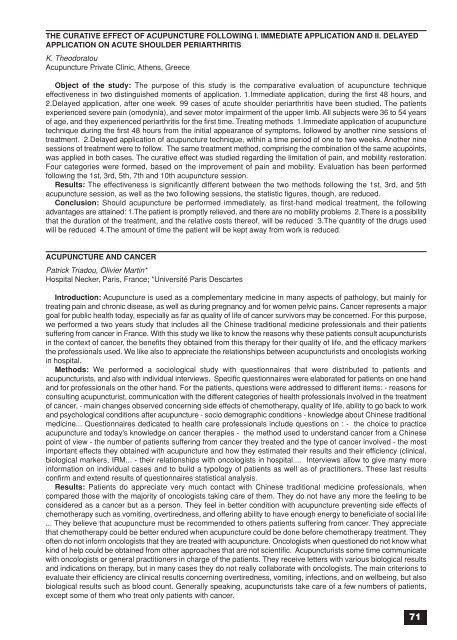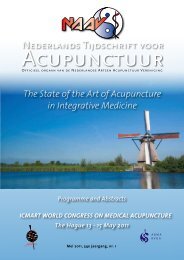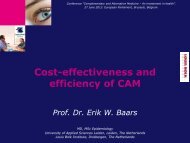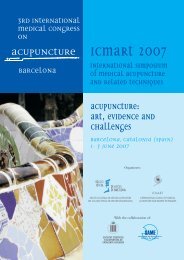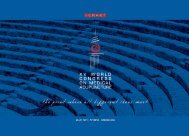Congress Abstracts full PDF - International Council of Medical ...
Congress Abstracts full PDF - International Council of Medical ...
Congress Abstracts full PDF - International Council of Medical ...
Create successful ePaper yourself
Turn your PDF publications into a flip-book with our unique Google optimized e-Paper software.
THE CURATIVE EFFECT OF ACUPUNCTURE FOLLOWING I. IMMEDIATE APPLICATION AND II. DELAYED<br />
APPLICATION ON ACUTE SHOULDER PERIARTHRITIS<br />
K. Theodoratou<br />
Acupuncture Private Clinic, Athens, Greece<br />
Object <strong>of</strong> the study: The purpose <strong>of</strong> this study is the comparative evaluation <strong>of</strong> acupuncture technique<br />
effectiveness in two distinguished moments <strong>of</strong> application. 1.Immediate application, during the first 48 hours, and<br />
2.Delayed application, after one week. 99 cases <strong>of</strong> acute shoulder periarthritis have been studied. The patients<br />
experienced severe pain (omodynia), and sever motor impairment <strong>of</strong> the upper limb. All subjects were 36 to 54 years<br />
<strong>of</strong> age, and they experienced periarthritis for the first time. Treating methods 1.Immediate application <strong>of</strong> acupuncture<br />
technique during the first 48 hours from the initial appearance <strong>of</strong> symptoms, followed by another nine sessions <strong>of</strong><br />
treatment. 2.Delayed application <strong>of</strong> acupuncture technique, within a time period <strong>of</strong> one to two weeks. Another nine<br />
sessions <strong>of</strong> treatment were to follow. The same treatment method, comprising the combination <strong>of</strong> the same acupoints,<br />
was applied in both cases. The curative effect was studied regarding the limitation <strong>of</strong> pain, and mobility restoration.<br />
Four categories were formed, based on the improvement <strong>of</strong> pain and mobility. Evaluation has been performed<br />
following the 1st, 3rd, 5th, 7th and 10th acupuncture session.<br />
Results: The effectiveness is significantly different between the two methods following the 1st, 3rd, and 5th<br />
acupuncture session, as well as the two following sessions, the statistic figures, though, are reduced.<br />
Conclusion: Should acupuncture be performed immediately, as first-hand medical treatment, the following<br />
advantages are attained: 1.The patient is promptly relieved, and there are no mobility problems 2.There is a possibility<br />
that the duration <strong>of</strong> the treatment, and the relative costs there<strong>of</strong>, will be reduced 3.The quantity <strong>of</strong> the drugs used<br />
will be reduced 4.The amount <strong>of</strong> time the patient will be kept away from work is reduced.<br />
ACUPUNCTURE AND CANCER<br />
Patrick Triadou, Olivier Martin*<br />
Hospital Necker, Paris, France; *Université Paris Descartes<br />
Introduction: Acupuncture is used as a complementary medicine in many aspects <strong>of</strong> pathology, but mainly for<br />
treating pain and chronic disease, as well as during pregnancy and for women pelvic pains. Cancer represents a major<br />
goal for public health today, especially as far as quality <strong>of</strong> life <strong>of</strong> cancer survivors may be concerned. For this purpose,<br />
we performed a two years study that includes all the Chinese traditional medicine pr<strong>of</strong>essionals and their patients<br />
suffering from cancer in France. With this study we like to know the reasons why these patients consult acupuncturists<br />
in the context <strong>of</strong> cancer, the benefits they obtained from this therapy for their quality <strong>of</strong> life, and the efficacy markers<br />
the pr<strong>of</strong>essionals used. We like also to appreciate the relationships between acupuncturists and oncologists working<br />
in hospital.<br />
Methods: We performed a sociological study with questionnaires that were distributed to patients and<br />
acupuncturists, and also with individual interviews. Specific questionnaires were elaborated for patients on one hand<br />
and for pr<strong>of</strong>essionals on the other hand. For the patients, questions were addressed to different items: - reasons for<br />
consulting acupuncturist, communication with the different categories <strong>of</strong> health pr<strong>of</strong>essionals involved in the treatment<br />
<strong>of</strong> cancer, - main changes observed concerning side effects <strong>of</strong> chemotherapy, quality <strong>of</strong> life, ability to go back to work<br />
and psychological conditions after acupuncture - socio demographic conditions - knowledge about Chinese traditional<br />
medicine... Questionnaires dedicated to health care pr<strong>of</strong>essionals include questions on : - the choice to practice<br />
acupuncture and today's knowledge on cancer therapies - the method used to understand cancer from a Chinese<br />
point <strong>of</strong> view - the number <strong>of</strong> patients suffering from cancer they treated and the type <strong>of</strong> cancer involved - the most<br />
important effects they obtained with acupuncture and how they estimated their results and their efficiency (clinical,<br />
biological markers, IRM... - their relationships with oncologists in hospital.... Interviews allow to give many more<br />
information on individual cases and to build a typology <strong>of</strong> patients as well as <strong>of</strong> practitioners. These last results<br />
confirm and extend results <strong>of</strong> questionnaires statistical analysis.<br />
Results: Patients do appreciate very much contact with Chinese traditional medicine pr<strong>of</strong>essionals, when<br />
compared those with the majority <strong>of</strong> oncologists taking care <strong>of</strong> them. They do not have any more the feeling to be<br />
considered as a cancer but as a person. They feel in better condition with acupuncture preventing side effects <strong>of</strong><br />
chemotherapy such as vomiting, overtiredness, and <strong>of</strong>fering ability to have enough energy to beneficiate <strong>of</strong> social life<br />
... They believe that acupuncture must be recommended to others patients suffering from cancer. They appreciate<br />
that chemotherapy could be better endured when acupuncture could be done before chemotherapy treatment. They<br />
<strong>of</strong>ten do not inform oncologists that they are treated with acupuncture. Oncologists when questioned do not know what<br />
kind <strong>of</strong> help could be obtained from other approaches that are not scientific. Acupuncturists some time communicate<br />
with oncologists or general practitioners in charge <strong>of</strong> the patients. They receive letters with various biological results<br />
and indications on therapy, but in many cases they do not really collaborate with oncologists. The main criterions to<br />
evaluate their efficiency are clinical results concerning overtiredness, vomiting, infections, and on wellbeing, but also<br />
biological results such as blood count. Generally speaking, acupuncturists take care <strong>of</strong> a few numbers <strong>of</strong> patients,<br />
except some <strong>of</strong> them who treat only patients with cancer.<br />
71


